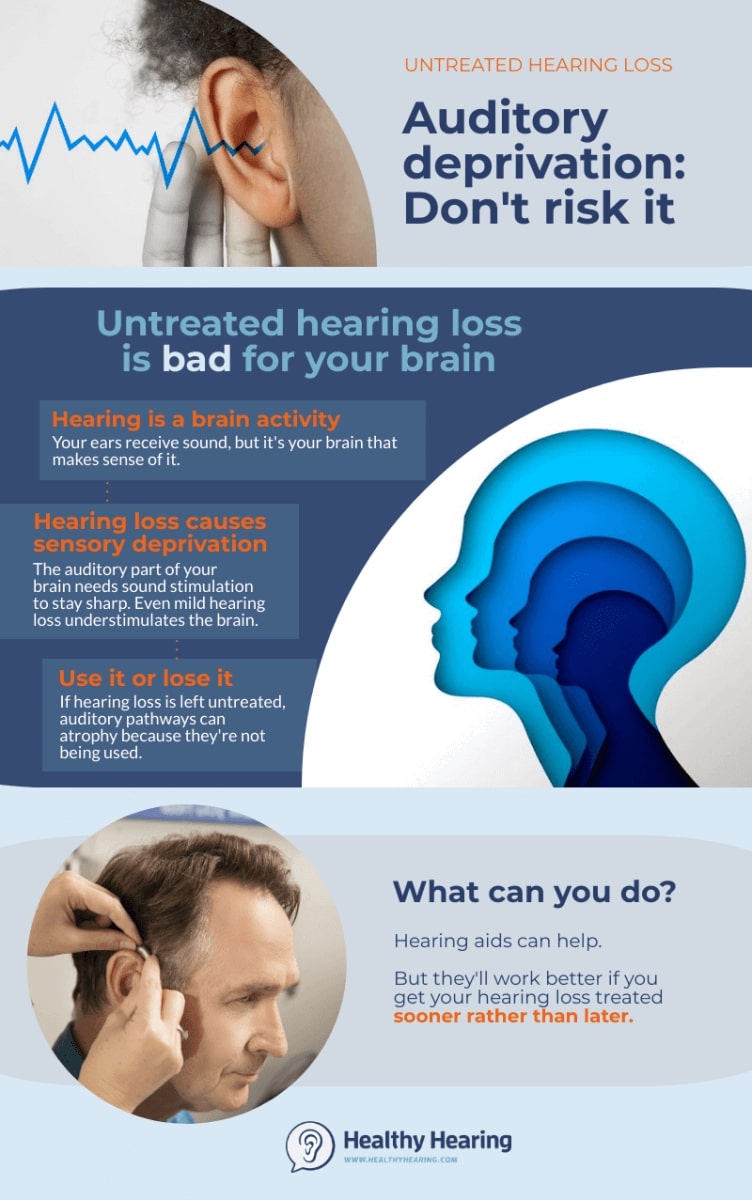Key points:
-
Hearing loss causes auditory deprivation, a type of sensory impairment.
-
If left untreated, it can lead to shrinkage in the parts of the brain that process sound.
-
Hearing aids can reverse this process, but they are less effective if a person has had untreated hearing loss for a long time.
Auditory deprivation occurs when your brain is deprived of sound, such as from untreated hearing loss. Over time, your brain loses the ability to process sound. If left untreated, the parts of the brain normally responsible for hearing get "reassigned" to other tasks. Those parts also tend to shrink or atrophy.
And it can affect anyone with hearing loss, not just severe cases.
“Auditory deprivation is when the brain has difficulty understanding and processing information due to the lack of stimulation,” said audiologist Jenilee P. Pulido, AuD, of HearCare Audiology Center in Sarasota, Fla.

Brain atrophy from untreated hearing loss
Hearing is a brain activity (sometimes referred to as "brain hearing"). Your ears deliver sound as electrical impulses via the auditory nerve, but it’s within your brain that these electrical impulses are translated into what we recognize as sound.
When fewer sounds make their way to the brain, the brain reacts by shifting how it operates. Even with only minor hearing loss, the parts of your brain that handle auditory processing can switch to visual processing instead, per a 2014 study on how hearing loss reorganizes the brain. Other negative changes in your brain may happen as well, and as a result, even after getting hearing aids, processing sounds may be challenging. In rare cases, auditory hallucinations can result, known as "musical ear syndrome."
If you let hearing loss go untreated for too long, the auditory parts of your brain may be "reassigned" to other functions. This can make it harder to treat hearing loss with standard treatments like hearing aids. Audiologists call this phenomenon "use it or lose it."
Use it or lose it: Hearing loss and brain function
Talk to audiologists about hearing, and there’s one phrase that you’ll hear time and again: Use it or lose it.
“The longer you wait to seek treatment, the [more the] brain has trouble understanding and processing information,” says Pulido, who is a fellow with the American Academy of Audiology.
That is, you may “hear” the sounds of someone talking, but your brain will struggle to understand the actual words being used. Some people may feel like they have cognitive decline when it's really just hearing loss.
Is auditory deprivation permanent?
It’s unclear if the cerebral atrophy is permanent or not, and it likely varies from person to person.
Overall, though, the "brain is very [flexible] and it can make a lot of changes—once it’s being stimulated, new connections can form so that it can understand more information,” Pulido says.
A small study on neurocognitive benefits found that wearing hearing aids “may reverse compensatory changes in cortical resource allocation”—in other words, negative changes in your brain may improve with consistent hearing aid use. Brain shrinkage may slow or stop, and your brain my begin to pick up on sound signals once more.
Causes of auditory deprivation
One common way people develop auditory deprivation is by avoiding hearing loss treatment. For example, if hearing aids remain in their case (and not in your ears), then auditory deprivation can result.
“This mostly comes about when someone has a diagnosed hearing loss and they don’t treat that hearing loss,” Pulido says. “Over the time of not getting that auditory stimulation that connection between the ears and the brain gets weak." The auditory nerve begins to atrophy and weaken, she says.
Another reason it may occur is when people have hearing loss in both ears, but only wear a hearing aid in one ear, she says.
Why two hearing aids are important
People may opt for a single hearing aid because they think it’s less conspicuous or find it more comfortable. But often, Pulido says, it’s due to the price of hearing aids. Regardless of the reason, using one hearing aid—when both ears have hearing loss—will have a negative impact.
“The one side that wears the hearing device will stay nice and strong, but the other side that isn’t treated with a hearing device can get weak and start to atrophy more than the other side that’s getting help,” Pulido says.
More: Why two hearing aids are better than one
Auditory deprivation can also be caused by hearing aids that don’t fit well or aren’t programmed properly—that’s one of the reasons it’s key to follow-up with your audiologist or hearing instrument specialist if you hate your hearing aids.
Keep in mind that hearing aids are customized to your unique hearing loss and are far more complex than eyeglasses. You may need more than one office visit to figure out how to use them correctly. Also, your hearing will change over time, so make sure to keep up with your hearing care appointments.
Hearing aid adjustment may take a while
Some patience is required with hearing aids. Unlike glasses, where you’ll be good to go from nearly the moment you slip them on, getting used to the restoration of sound can be a more gradual process, Pulido says. It’s also different for everyone—some people acclimate in days or weeks, while others take longer.
Putting on hearing devices can take some adjustment, especially if it’s been awhile since your hearing was at full force.
“The most common type of hearing loss is slow and gradual—so you get used to it, and think it’s normal to hear like that,” Pulido points out. Your brain gets used to it, too. With the hearing aids on, sounds in your environment (like the hum of the dishwasher or fridge) can seem loud, as can the sound of your own voice, Pulido says.
The good news: With time, you’ll adjust
“Over time, if you wear the devices consistently, the brain gets used to the sound and acclimates,” Pulido says.
But some patience is required—unlike glasses, where you’ll be good to go from nearly the moment you slip them on, getting used to the restoration of sound can be a more gradual process, Pulido says. It’s also different for everyone—some people acclimate in days or weeks, while others take longer.
Once you've adjusted, try to avoid taking any "hearing aid holidays." Wear your hearing aids all day, even if you're home alone. This keeps your hearing—and your brain—sharp.
Auditory training to sharpen hearing
Another helpful tool can be auditory rehabilitation. Similar to physical therapy, auditory rehab focuses on helping your brain relearn some of the receptive communication skills it may have lost. New at-home auditory training games make it easy to try, and listening to audiobooks also counts as useful aural therapy. These programs can be especially useful if you want to work on improving listening fatigue.
Prevent auditory deprivation before it starts
Of course, the best way to avoid auditory deprivation from occurring is to be proactive when it comes to your hearing.
The American Speech-Language-Hearing Association (ASHA) recommends that adults get a hearing screening every 10 years up until age 50, and after that, once every three years.
“We recommend that everyone over age 50 get a hearing screening or a diagnosis evaluation, whether they have hearing issues or not,” Pulido says. “It’s so important to get a hearing test early."




 Madeleine Burry is a Brooklyn-based freelance writer and editor. She's written about health for several online publications, including Women's Health, Prevention, Health, Livestrong and Good Housekeeping. You can follow her on Twitter @lovelanewest.
Madeleine Burry is a Brooklyn-based freelance writer and editor. She's written about health for several online publications, including Women's Health, Prevention, Health, Livestrong and Good Housekeeping. You can follow her on Twitter @lovelanewest.